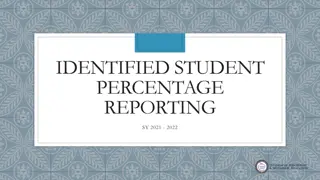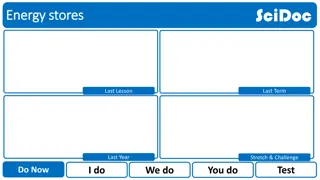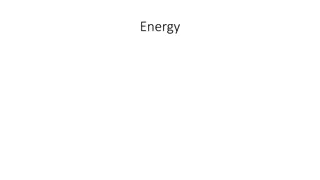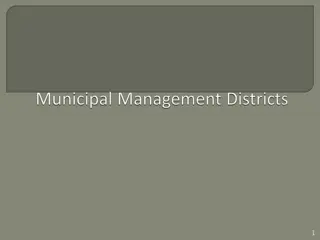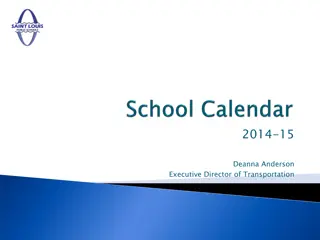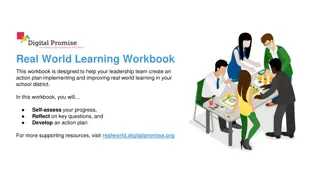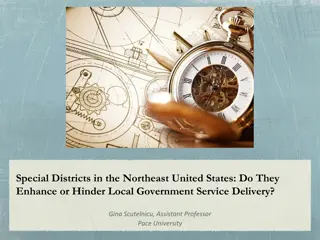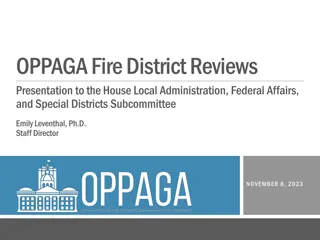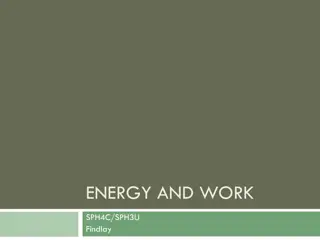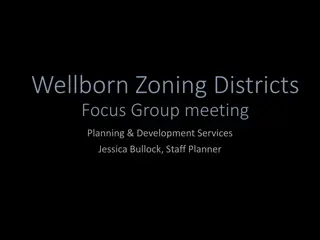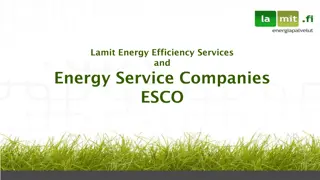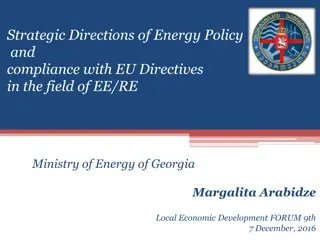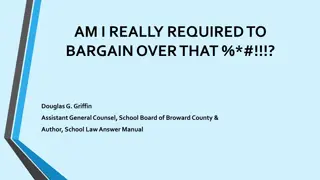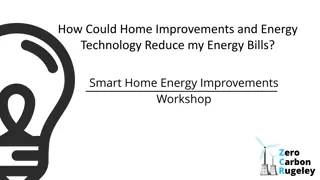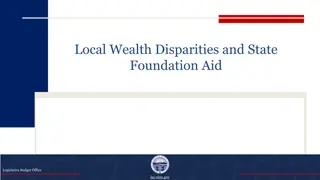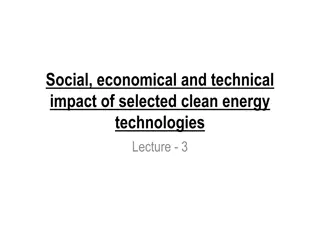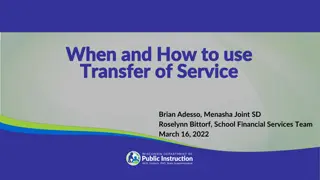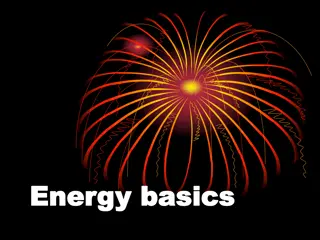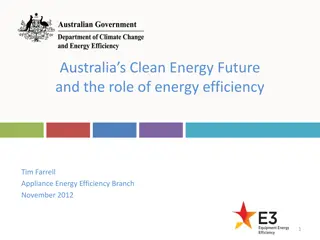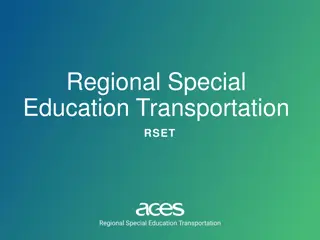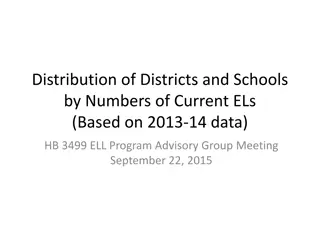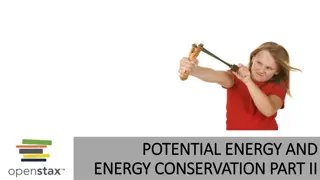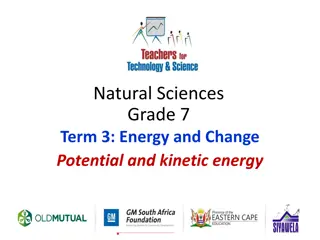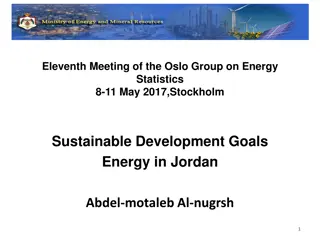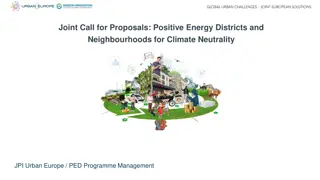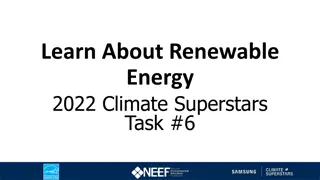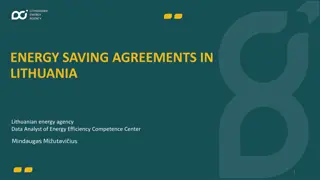Green Energy Market
Green energy also referred to as clean energy, is usually derived from natural sources that are constantly replenished. Solar energy, wind energy, hydroelectric power, biomass energy, geothermal energy, tidal energy, and wave energy are different types of renewable energy. Solar energy is the radian
6 views • 6 slides
Special Education Circuit Breaker Program Overview FY2024
The Special Education Circuit Breaker Program for FY2024 provides financial assistance to public school districts for high-cost special education services. The program includes Relief Claims and Year-End Claims cycles, with legal references for reimbursement guidelines. Reserve Relief funds are avai
1 views • 27 slides
Comprehensive Overview of Energy Balances in Germany
This material covers various aspects of energy balances in Germany, including components of energy flowcharts, renewable energy sources in the German energy balance, and total final consumption of road transport energy. It provides a detailed analysis of energy imports, domestic extraction, losses,
2 views • 10 slides
Understanding Energy: Types, Potential, and Kinetic
Dive into the world of energy with a comprehensive guide covering the definition, types, and characteristics of gravitational, potential, and kinetic energy. Explore how energy is the driving force behind all work and movement, with examples and explanations provided for each energy type. Gain insig
2 views • 24 slides
Sustainable Energy Initiatives at Local Level in Lithuania
The National Parliamentary Workshop on Energy Efficiency highlighted the importance of renewable energy development and sustainability at the local level in Lithuania. Initiatives such as the Breakthrough package and Renewable Energy Communities aim to improve energy efficiency, reduce energy povert
2 views • 12 slides
Identifying Student Percentage Reporting SY 2021 - 2022
Identified Student Percentage Reporting (ISP) is essential for districts to report the number of students identified through direct certification and categorical lists in eSchool. This report must be submitted by April 15, 2022, to comply with federal regulations. Understanding how ISP is calculated
1 views • 12 slides
Exploring Energy Stores and Transfers in Science Lessons
Dive into the fascinating world of energy stores and transfers through engaging science lessons. Recall different energy stores, common energy transfers, and create flow diagrams to illustrate energy transfers in various scenarios. Explore gravitational, elastic, magnetic, electrostatic potential en
5 views • 9 slides
Energy Assistance Workshop Series Statewide Assessment
The Energy Assistance Workshop Series conducted a statewide assessment to understand energy burden and discuss utility energy assistance programs. The goal was to evaluate the effectiveness of mechanisms for energy assistance to prioritize households with higher energy burdens. The workshops aimed t
0 views • 26 slides
Understanding Energy Transformation in the Natural World
Energy transformation occurs continuously in various forms around us, following the Law of Conservation of Energy. From thermal to chemical and electromagnetic energy, different types of energy are converted and utilized in everyday processes. Examples include the conversion of thermal energy to ele
0 views • 27 slides
Understanding Energy - Forms, Calculations, and Applications
Explore the concept of energy through various images, including forms of energy, kinetic versus potential energy, and calculations involving kinetic and potential energy. Learn about identifying energy states, calculating kinetic energy, and solving physics problems related to energy transfer. Dive
0 views • 27 slides
Understanding Municipal Management Districts (MMDs) in Texas
Municipal Management Districts (MMDs) in Texas are special districts that are self-governed but require approval from the host municipality. They have the authority to provide infrastructure and approved service plans. MMDs can issue tax-exempt bonds, levy taxes, assessments, and impact fees, and pr
7 views • 21 slides
Understanding Energy Transfers with Sankey Diagrams
Sankey diagrams are visual tools that depict energy transfers within a system, offering insights into efficiency and energy distribution. By examining the width of arrows representing energy flow, one can analyze useful and wasted energy outputs. Inefficient systems show a disproportionate amount of
1 views • 9 slides
School Calendars and Comparative Analysis for St. Louis Public Schools 2014-2015
Executive Director Deanna Anderson presented the 2014-15 school calendar, compared calendars from other districts, and sought public input. Meetings with staff and analysis of surrounding districts were conducted to finalize the academic schedule. Key dates from various school districts were outline
0 views • 8 slides
Louisiana Cultural Districts: Engaging Communities in Cultural Development
The Louisiana Cultural Districts program, under the Cultural Economy Initiative, aims to revitalize local communities by creating hubs of cultural activity. By building on cultural resources and promoting art and culture, the program benefits from increased occupancy, commerce, and community identit
2 views • 18 slides
Overview of SAPSASA Hockey Current State and Districts for Boys and Girls in 2015
SAPSASA Hockey in 2015 discussed the current state of the game, with detailed information on districts, teams, and age groups. It highlighted the need for growth and sustainability through collaboration with clubs and organizations. The document also outlined specific districts for boys and girls, e
0 views • 8 slides
Conducting an Effective School Energy Audit
Performing an energy audit at a school helps in understanding energy usage patterns, identifying areas of waste, and creating energy-saving action plans. The audit involves collecting data, creating switch-off lists, and filling out templates methodically to track energy consumption. It should be do
0 views • 16 slides
Real World Learning Workbook for School Districts
This workbook is designed to assist leadership teams in creating an action plan to implement and enhance real-world learning in their school districts. It involves self-assessment, reflection, and action plan development. The vision, considerations, and action items for real-world learning are explo
0 views • 25 slides
Special Districts in the Northeast United States: Enhancing or Hindering Local Government Service Delivery?
Special districts in the Northeast US, independent units of local government, professionalize public service management. They have specialized functions, administrative and financial independence, and low political visibility. The study aims to develop a typology of multi-purpose special districts f
0 views • 12 slides
Special Fire District Performance Reviews Overview
Presentation on the OPPAGA Fire District Reviews detailing statutory requirements, research objectives, findings for individual districts, and recommendations for special fire control districts in rural areas. The performance reviews cover governance, service delivery, resource management, and more,
0 views • 34 slides
Understanding Different Forms of Energy and Work in Physics
Energy in physics is the capacity to do work, and there are various forms of energy such as radiant energy, kinetic energy, gravitational potential energy, elastic potential energy, chemical potential energy, nuclear potential energy, electrical potential energy, thermal energy, and sound energy. Ea
0 views • 47 slides
Wellborn Zoning Districts Focus Group Meeting
Wellborn Zoning Districts Focus Group Meeting involves planning and development services led by Jessica Bullock, Staff Planner. The districts discussed include Wellborn Estate and Wellborn Restricted Suburban, each with specific purpose statements and dimensional standards. Wellborn Estate focuses o
0 views • 11 slides
Understanding the Truth about Districts and Homeownership Risks
Debunking common misconceptions about districts, this discussion sheds light on the limited obligations and protections for homeowners. It explains how districts provide financial viability and transparency, showcasing the intelligence of homeowners in evaluating their choices.
0 views • 11 slides
Understanding Energy Service Companies (ESCOs) and Their Role in Energy Efficiency
Energy Service Companies (ESCOs) like Lamit offer a range of energy services, from implementing energy-efficiency projects to renewable energy solutions. These companies work as long-term energy management partners, focusing on understanding customer needs, providing energy-saving solutions, and gua
2 views • 18 slides
Overview of Energy Policy and Compliance with EU Directives in Georgia
Ministry of Energy in Georgia focuses on strategic directions for energy policy in alignment with EU directives. The Energy Strategy, Covenant of Mayors, and National Energy Efficiency Action Plan are key initiatives promoting energy efficiency and renewable energy. Projects include consultancy on s
0 views • 10 slides
Understanding Collective Bargaining in School Districts
Collective bargaining in school districts involves negotiating over mandatory and permissive subjects such as wages, hours, and conditions of employment. School districts must differentiate between mandatory and permissive subjects, and disputes over mandatory subjects must be resolved through impas
0 views • 29 slides
Exploring Home Energy Improvements and Smart Technology for Energy Efficiency
Discover how home improvements and energy technology can significantly reduce energy bills. Join the Smart Home Energy Improvements Workshop in Zero Carbon Rugeley to explore approaches for sustainable energy production and usage at home. Learn about retrofitting, smart energy systems, and meet char
0 views • 20 slides
Addressing Local Wealth Disparities in Ohio's School Funding
School districts in Ohio experience significant variations in property values, affecting their ability to generate local revenue. The state's school funding formula aims to neutralize the impact of local property wealth on educational opportunities by providing more aid to lower-wealth districts. Th
0 views • 5 slides
Social, Economical, and Technical Impact of Clean Energy Technologies
This course covers the management of micro-level clean energy projects, emphasizing the social, economic, and technical impacts of selected clean energy technologies. It discusses project organization, tools, project life cycle, financial analysis, barriers, capacity building, and more. It delves in
0 views • 32 slides
Understanding Transfer of Service (TOS) in Wisconsin School Districts
Transfer of Service (TOS) in Wisconsin school districts involves the transfer of financial responsibility from a local municipality to a school district, allowing for exemptions to revenue limits. Eligibility requirements include being within the application timeline and having students come from ot
0 views • 36 slides
Teacher Salary Comparison in Fayette County vs. Jessamine County School Districts
This slide provides a comparison of teacher salaries in Fayette County and Jessamine County School Districts for different education levels and years of experience. It highlights the differences in pay scales between the two districts, showcasing the earning potential for teachers at various stages
0 views • 4 slides
Understanding Energy Basics: Temperature, Heat, and Transfer
Explore the fundamental concepts of energy, including temperature, heat, and energy transfer. Learn how temperature differs from heat, how they are measured, and the relationship between thermal energy and water volume. Discover the role of chemical energy and sound energy, and how energy is transfo
0 views • 12 slides
Australia's Clean Energy Future: Role of Energy Efficiency Programs
The discussion revolves around Australia's clean energy future and the pivotal role of energy efficiency in driving sustainable practices. It covers topics such as the Carbon Pricing Mechanism, Encouraging Energy Efficiency initiatives, and the Equipment Energy Efficiency Program (E3). The success s
0 views • 13 slides
Regional Special Education Transportation (RSET) Program Overview
RSET, which stands for Regional Special Education Transportation, is an initiative developed by ACES to help districts save money while safely transporting students to out-of-district placement sites. The program benefits districts by reducing transportation costs, addressing parent concerns, and ma
0 views • 13 slides
Analysis of EL Numbers in Oregon Schools and Districts
This analysis, presented during the HB 3499 ELL Program Advisory Group Meeting, highlights the distribution of Oregon districts and schools based on the number of current English Learners (ELs). It emphasizes the importance of considering EL numbers in identifying low-performing institutions and dis
0 views • 4 slides
Understanding Elastic Potential Energy and Energy Conservation Principles
Elastic potential energy is stored in elastic bodies like springs and is vital in understanding energy conservation principles. This energy can be calculated using the work done by an ideal spring on a block. By applying elastic potential energy concepts, one can analyze scenarios where a spring sys
0 views • 9 slides
Understanding Energy: Potential and Kinetic Forms in Grade 7 Natural Sciences
Energy in various forms is explored in Grade 7 Natural Sciences, with a focus on potential and kinetic energy. Energy is the ability to do work and exists in different types like heat, chemical, electromagnetic, nuclear, and mechanical. The sun serves as a primary energy source. Potential energy is
0 views • 11 slides
Energy Strategy and Challenges in Jordan: Towards Sustainable Development
The Eleventh Meeting of the Oslo Group on Energy Statistics discussed the energy sector in Jordan, highlighting challenges such as population growth, energy demand, and high energy costs. Jordan aims to diversify energy resources, reduce oil dependency, and enhance environmental protection through i
0 views • 34 slides
Joint Call for Proposals - Positive Energy Districts and Neighbourhoods for Climate Neutrality
This joint call for proposals, facilitated by JPI Urban Europe, focuses on developing Positive Energy Districts and Neighbourhoods to address climate neutrality goals. The initiative aims to enhance knowledge and support large-scale implementation by 2025, aligning with Horizon Europe's mission for
0 views • 14 slides
Understanding Renewable Energy and its Benefits in 2022
Renewable energy sources like wind, waves, tides, sunlight, geothermal heat, and biomass play a crucial role in combating climate change by reducing greenhouse gas emissions. This task educates about the differences between renewable and non-renewable energy sources, the benefits of renewables, and
0 views • 10 slides
Energy Saving Agreements in Lithuania: Legal Framework and Targets
Lithuania's energy saving agreements are guided by a comprehensive legal framework including laws on energy efficiency and methodologies for energy audits. The country has set ambitious energy efficiency targets for 2030, focusing on sectors like building renovation, industry, and household applianc
0 views • 14 slides





